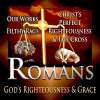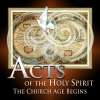
Sunday, January 23, 2011
by Robert Dean
Passage: Colossians
Series: Colossians (2011)
Duration: 50 mins 53 secs

Thursday, August 11, 2011
by Robert Dean
Passage: Romans 2:25-3:5
Series: Romans (2010)
Duration: 1 hr 1 mins 24 secs
Is there a sufficient moral pathway to God that a man can take on his own? As we continue in our study of Romans, Paul again reminds us how God demonstrates His Righteousness with regard to the human race. In this lesson we learn about the significance of circumcision and the difference between a circumcised and uncircumcised heart.

Tuesday, October 09, 2012
by Robert Dean
Passage: Acts 9:32-43
Series: Acts (2010)
Duration: 1 hr 3 mins 46 secs
This section of Acts shifts focus to Peter and his preparation to present salvation to the Gentiles. See how and where God leads Peter into Gentile territory armed with his apostolic credentials. In whose name does Peter use these credentials? Look at parallel passages where Jesus heals and why the Jews should have understood these miracles as signs revealing Jesus as Messiah. How does healing in the Old Testament become another link connecting the signs the Jews refused to see? How does Peter’s vision in chapter 10 reveal a new direction from Law to grace in an entirely new focus that reaches out to Gentiles who want to know God?

Sunday, December 16, 2012
by Robert Dean
Passage: Colossians 4:2-18
Series: Colossians (2011)
Duration: 58 mins 45 secs
Prayer has high priority in scripture. It is good to interrupt and reevaluate a routine filled with responses to small crises. Prayer deserves focused attention, reflection, and concentration, which require time. God communicates with us through His Word. Our response is to communicate with Him through continual prayer and obedience in application of scripture. Since God’s revelation in scripture is sufficient, there is no need for Him to grant us new revelation in His answer. What are the categories of prayer? What specific prayer is Paul asking for as he continues to spread the gospel? How does the request to walk in wisdom apply when we try to communicate the gospel message? Find out to whom Paul gives his final greetings in Colossi and the roles they have had in Paul’s life.Note: Due to technical difficulties the audio and video may be out of sync on the video of this class.

Tuesday, December 18, 2012
by Robert Dean
Passage: Acts 13 & Matthew 16:15-18
Series: Acts (2010)
Duration: 59 mins 1 sec
Acts is a transition, a historical narrative that is descriptive, not a prescriptive pattern of what happens in the Church today. The phenomena of the church growth movement in the late 60s based church growth on sociological issues and stressed experience as a validation of the Bible. As is often the case with Satan’s plan, this method seemed to work. But understand fully the instruction Jesus gives Peter to feed His lambs while He builds the church. Jesus doesn’t tell Peter to manage an organization through techniques in church growth, but instructs him to proclaim and teach. Review Paul’s journeys and allow instruction from his many discourses to teach us how we can maximize our approach with the message of God’s Word to people in our lives with differing backgrounds.Also includes John 21:15-17

Tuesday, January 22, 2013
by Robert Dean
Passage: Acts 13:1-25
Series: Acts (2010)
Duration: 1 hr 2 mins 33 secs
The gift of prophesy still existed in Acts before direct revelation ceased after the Canon was complete. The Holy Spirit, in specific divine guidance, actually called out Barnabas and Saul (who certainly had this gift), to take the gospel to these destinations. Learn the meaning of Saul’s name and the significance of his new name. Travel their path; encounter their resistance and the positive response. Learn about how the synagogue functioned. See how Paul spoke to these Jews, encapsulating Jewish history and focus in few words and introducing its long-awaited fulfillment through the death and resurrection of Jesus Christ. We learn that evangelism may be most effective when the presentation is specific to the hearer.

Tuesday, January 29, 2013
by Robert Dean
Passage: Acts 13:13-38
Series: Acts (2010)
Duration: 1 hr 0 mins 49 secs
Paul is giving the gospel to Jews and God-fearing Gentiles in the local synagogue. Paul addresses them within the framework of their familiar as he anchors his message deeply within scripture, stressing their understanding of forgiveness of sin and justification. If it were only that easy to approach an unbeliever today, one who had such a deep knowledge of scripture. This is highly unlikely. Our approach must confront the realities of their position. The optimal starting point is for us to be profoundly familiar with the Word and to have a developed relationship with our audience. Paul will show us how to deal with a variety of circumstances so that we will have a pattern from which to launch our own approach and the assurance that rugged roadblocks aren’t necessarily terminal.

Tuesday, February 12, 2013
by Robert Dean
Passage: Acts 13:13-39
Series: Acts (2010)
Duration: 1 hr 1 mins 31 secs
In this section Paul continues the gospel message to these Jews by shifting to the Davidic Covenant, a promise which was very familiar to them. Review the Davidic Covenant which is an elaboration of the seed promise in the Abrahamic Covenant. Walk back through numerous Old Testament Messianic passages that address Israel’s future hope in turning to God, His restoration of the Land and promise to David of an eternal kingdom through his seed. See how directly Paul addresses these Jews on the basis of their well-known scripture and the unquestionable ways Paul presents to them, through recognition of the promise of the Davidic Covenant, that these things are fulfilled in Jesus Christ.

Tuesday, February 19, 2013
by Robert Dean
Passage: Acts 13:13-39
Series: Acts (2010)
Duration: 1 hr 5 mins 26 secs
As we see Paul focus on the gospel with the Jews in Antioch in Pisidia, we should be aware of some modern evangelistic challenges seen through a comparison of Lordship Salvation and Free Grace. Those in Paul’s audience knew the scriptures, so it was effective for him to string together prophesies pointing to Christ. Review many of these Old Testament promises and see the familiar terms imputation, justification, forgiveness, propitiation, righteousness, and Christ the Servant. How does the resurrection seal the fulfillment of the Messianic prophesies? Do these Jews respond to Paul’s message?

Tuesday, February 26, 2013
by Robert Dean
Passage: Acts 13:40-52
Series: Acts (2010)
Duration: 1 hr 6 mins 41 secs
 Interlocked
Interlocked Angelic Conflict
Angelic Conflict Angelic Rebellion (2020)
Angelic Rebellion (2020) Apologetics
Apologetics Basics: Intro to Christianity
Basics: Intro to Christianity Biblical Framework for Economics
Biblical Framework for Economics Birth of Christ
Birth of Christ Christianity and the American Republic
Christianity and the American Republic Church Leadership
Church Leadership Creation Special 2010
Creation Special 2010 Creation Studies
Creation Studies Divine Guidance
Divine Guidance Faith-Rest Drill: Learning to Trust God
Faith-Rest Drill: Learning to Trust God Has God Spoken? (2021)
Has God Spoken? (2021) Inspiration & Inerrancy
Inspiration & Inerrancy Interlocked (2023)
Interlocked (2023) Light From the Light Channel
Light From the Light Channel Marriage & Family
Marriage & Family Messiah
Messiah The Ministries of God the Holy Spirit Today
The Ministries of God the Holy Spirit Today Olivet Discourse
Olivet Discourse Redemption & Forgiveness
Redemption & Forgiveness Sermon on the Mount
Sermon on the Mount Spiritual Life: How Does a Christian Grow
Spiritual Life: How Does a Christian Grow Tabernacle Study
Tabernacle Study Understanding Judgment, Rewards, & Inheritance
Understanding Judgment, Rewards, & Inheritance Worship & Music
Worship & Music Worship, Biblical
Worship, Biblical